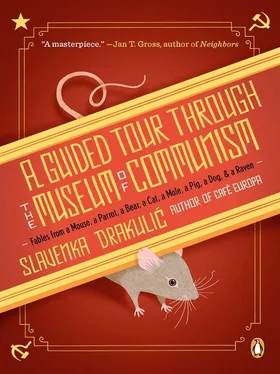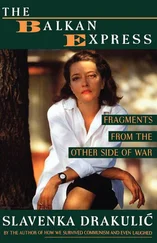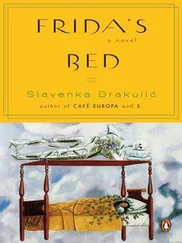“At least people now know that 1968 in Czechoslovakia was the beginning of the end,” the professor used to say. “They learned the hard way that Communism is not to be reformed. But never in their wildest dreams could they have imagined that another attempt to reform Communism—a copy of 1968!— would come from within the USSR itself, and that it would mean its demise. Did you know that Gorbachev was friends with Zdeněk Mlynář, one of the leading figures of the Prague spring? Ah, Gorby, hated and forgotten in his own country… I remember how the whole Western world applauded him, as if he really wanted to dispatch Communism to the ‘graveyard of history,’ as it were. His achievement was that he did not, could not, send the army against us again (or against other Communist countries, for that matter). And this made it possible for our revolution to be velvet. Not so velvet as one might think, though: My own son, a student then, got hit in the head by the police during the November seventeenth student protest. My daughter soon became a member of Obcanske forum and knew Vaclav Havel personally. To me it’s as if it all happened yesterday… Yet, it was twenty years ago when I was standing under the balcony at Vaclavske namesti, where Havel was speaking, and chanting: ‘Havel to the castle!’ We wanted him to become president, and imagine—he did! He did! But once the dream was fulfilled, reality sank in.”
Here in the museum we have a cinema where you could, if you had the time, see documentary films about the revolution. The velvet revolution is a well-documented event; even you, Hans, have heard of it. This perhaps is the reason why not that many visitors sit here and watch—they have already seen it somewhere. And here, in this cinema, is the end of the story about Communism. In the museum, I mean.
“What did the change bring me?” Milena says. “I’ve lost my job. I have less money. My husband drinks. Freedom? What freedom? We can’t travel anywhere, we can’t buy things. We don’t even have a car now, can’t afford to keep it,” she laments to Dáša, who can only share her feeling. I sometimes feel sorry for both of them; they are obviously among the losers. These two ladies are perhaps not the best advertisement for democracy and capitalism, I’d say. The change happened too late for them. Indeed, what a frustration it must be to finally live in an age of plenty but not to be able to enjoy it, don’t you think, Hans?
It seems to me, judging from the little knowledge I acquired as a mouse in the Museum of Communism, that this frustration might be the reason why there is still something mean and suspicious, something hypocritical in people. Vestiges of former times, I suppose. As if people haven’t changed that much, not in their minds. I will give you an example: Earlier I mentioned Milan Kundera. He is allegedly the most famous Czech writer; you might even have seen a film made in Hollywood adapted from his novel The Unbearable Lightness of Being ? You know him? Well then, you also know that all his early novels deal with Communist repression in his country, like The Joke . In that book, Ludvik ends up in a labor camp, in a mine, just because he wrote a postcard to a former girlfriend: “Optimism is the opium of the masses! A healthy atmosphere stinks of stupidity! Long live Trotsky!” He meant it as a joke, but the police judged it as political text. Kundera left Czechoslovakia and went to France after the invasion in 1968 and never returned. After that he became one of the best-known dissidents from the Communist world, next to Alexander Solzhenitsyn.
Suddenly, this same Kundera is in the middle of a scandal! I heard about it from a couple discussing it very loudly in this room just recently. In fact, they woke me up in the middle of my regular afternoon nap. What happened? In October 2008 a certain historian found a document that is taken as proof that Kundera is not what he seems to be. Not a moral man, but a denouncer no less. A document from 1950 is there to prove it. It is a police report, a short one. It states that Milan Kundera, at that time a student at the FAMU film academy and an ardent member of the CP, reported to the undersigned police inspector that there was a suspicious person staying in his dormitory. Following this, the police arrested Miroslav Dvoraček, a pilot and a spy for the American-supported Czech intelligence agency of that time. Dvoraček had illegally crossed the border back into Czechoslovakia and was on his way out again. Following Kundera’s report, the man was arrested and sentenced to twenty-two years of hard labor. Dvoraček served his sentence mostly in uranium mines. Yet, in his writing and interviews, Kundera never mentioned this episode.
“Now, again, we are seeing the resurrection of the same old pattern of suspicion that nobody is what he claims to be,” I heard the woman say angrily, as if she personally had suffered the consequence of his betrayal. “A dissident is not a dissident but a fugitive from his not very honorable past; a moral person is in fact immoral. Falsehood is truth, and so on. Until yesterday you would have believed that Kundera was a symbol of morality.”
“Well,” the man said, rather calmly, “every normal person should ask himself, But is that report real and not a setup? How come the document was discovered only now and by what ‘coincidenceʹ? No one believes in coincidences; there were too many of them in the past. Moreover, what’s the purpose of this ‘discovery’ and of publishing it? In short—who benefits from it today? I tend to just dismiss such coincidences; we should know better. No, the problem lies elsewhere: You see, true or not, the real problem is that this whole devilish story is believable. Convincing. Everybody agrees that it could have happened. It could have been that Kundera saw reporting on Dvoraček as his patriotic duty: He was a party member, he himself was in danger of going to prison if he didn’t report it, such were the times. It could have happened to anyone—or so the argument goes.”
“But this is the false argument!” the woman interrupted him. “Kundera is in no way ‘one of us ,’ Kundera is—well, Kundera. What about his confession, then? People say, Why doesn’t he confess now, when his big secret is out? He should get it off his chest. Nonsense! They say such nonsense, in my opinion, because if such a great writer and dissident had made such a terrible denunciation then our own denunciations and compromises would look comparatively much pettier. So what if Svoboda spied on Markus and he was transferred to a worse job? At least he did not wind up in prison.”
“I agree,” the man said. Now his voice sounded sad. “There is a certain malevolent triumph in the ‘fact’ (or the fact , depending on how you look at it) that the best of us all could have failed. Even if it is not true but only a suspicion, only a possibility—it excites people. It makes heroes more human, petty like the rest of us. If he would only confess, they would immediately grant him forgiveness!”
“Ah, yes, forgiveness! My foot! They couldn’t wait to take away his moral credibility—since they couldn’t take away his talent and his fame,” the woman added, even more worked up now . “But he is a stubborn old man. And he also must know that his confession would only make it easier for such people, but not for himself. In a way, all these questions are unimportant and belated, because the seed of suspicion has been planted. If he is not guilty, however hard he tries, Kundera won’t be able to wash himself clean of it. If he is guilty it is sad, but it doesn’t annihilate his writing. If this is some consolation to him . .. ,” she concluded.
Why am I telling you about this particular case? Because—the way I understand Communism—it still belongs to the museum. Twenty years after its collapse, it illustrates the state of people’s minds here.
Читать дальше












